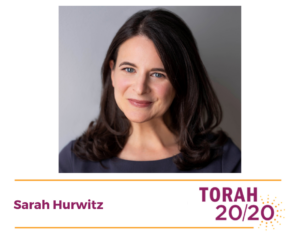A D’var Torah for Parshat Bereshit by Sarah Hurwitz
Excerpt from Here All Along: Finding Meaning, Spirituality, and a Deeper Connection to Life – in Judaism (After Finally Choosing to Look There)
The Torah represented a dramatic departure from many of the prevailing theological and political norms of the ancient Near East. The many gods that people worshipped in places like ancient Egypt and Mesopotamia each had their own life history and limited powers – over a particular activity (war, healing) or aspect of nature (sun, rain) – and they were often in conflict with each other. While rulers in ancient times were often thought to descend from or be favored by these gods, or even be gods themselves, ordinary people were generally regarded as insignificant, if not downright expendable. And rulers didn’t hesitate to press their lowly subjects into forced labor on various building projects.
By contrast, the God of the Torah has no birth story or biography, but rather is simply just there from the beginning. This God creates the world alone in an orderly fashion and doesn’t battle it out with any other gods. Indeed, this God is superior to all of them, with power over not just one aspect of the world, but the whole thing.
As for human beings, the Torah pointedly declares: “God created man in His image, in the image of God He created him; male and female He created them.”
This belief that every single one of us is created in the image of God has been cited as the defining Jewish idea, the beating heart of the entire Jewish enterprise. And you don’t have to believe in any kind of deity or higher power to appreciate its implications. Drawing on an ancient Jewish teaching, Rabbi Yitz Greenberg argues that this idea is shorthand for three fundamental truths, which he deems the “three inalienable dignities”:
- We are each of infinite worth – no one is expendable, and we cannot quantify the value of any human life.
- We are all fundamentally equal – no human being is any more important than any other human being.
- We are each totally unique – there is no one else like us, and no one is interchangeable with anybody else.
This may all sound obvious, like the basic values we try to teach our kids. But none of this was obvious back in ancient times. And I don’t think it’s obvious today either. If we really thought the man we passed on the street who asked if we could spare a dollar was as fundamentally worth as a CEO or celebrity, I doubt we would ignore him. While in theory we believe in equality, in practice, American children start out with wildly different opportunities depending on the color of their skin, the families into which they happen to be born, and many other factors, and we do little to remedy those inequalities. And in recent years, we have become increasingly polarized, seeing “those people” who disagree with us as an undefined group, all the same, rather than unique individuals.
The Torah sounded the alarm about all of this thousands of years ago, not just with its laws, but with the very story of God choosing the Israelites for the covenant in the first place. The Israelites were, to put it bluntly, the losers of the ancient world, as were their ancestors. Abraham was not a king. Moses was not a great warrior – when God came to him in the burning bush, he was a fugitive shepherd with a fear of public speaking. And if you were a typical ancient Near Eastern god looking to create a great nation, a tribe of anxious former slaves probably would not have been your top choice.
The Israelites were an extreme test case for how serious the Torah was about this In-the-Image idea. And even they passed the test. These highly fallible matriarchs and patriarchs and this ragtag bunch of newly freed slaves are just as much in the Divine image as any emperor or king. And if that is true for them, then it must be true for all of us as well.
 Excerpted from Here All Along by Sarah Hurwitz. Copyright © 2019 by Sarah Hurwitz. Excerpted by permission of Random House Group, A Penguin Random House Company. All rights reserved. No part of this excerpt may be reproduced or reprinted without permission in writing from the publisher.
Excerpted from Here All Along by Sarah Hurwitz. Copyright © 2019 by Sarah Hurwitz. Excerpted by permission of Random House Group, A Penguin Random House Company. All rights reserved. No part of this excerpt may be reproduced or reprinted without permission in writing from the publisher.
To purchase a copy of Here All Along, visit www.SarahHurwitz.net
From 2009 to 2017, Sarah Hurwitz served as a White House speechwriter, first as a senior speechwriter for President Barack Obama and then as head speechwriter for First Lady Michelle Obama. Prior to serving in the Obama Administration, Sarah was chief speechwriter for Hillary Clinton on her 2008 presidential campaign.

